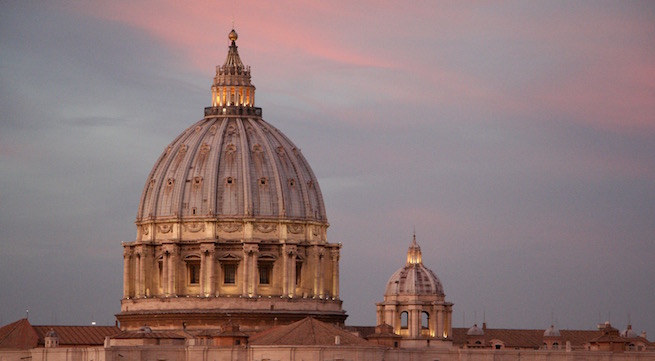Dissenters Express High Hopes for Synod
Meanwhile orthodox-thinking Catholics to reassert Church doctrine with four major Rome conferences scheduled for this week

Beginning with the dissenters, Swiss Vaticanist Giuseppe Rusconi has helpfully summarized their views on Pope Francis and the synod. The heterodox views of 30 individuals including Italian priests, a bishop, and a leftist politician appear in a special issue of “Micromega”, a secularist journal, published in time for the synod.
With the exception of two who are strongly critical, the other contributors are very satisfied with the Pope and see him as a vehicle for their ideas and agendas.
For example, Rusconi cites Vittorio Bellavite, national coordinator of the dissenting group “We Are Church”, who praises the fact that opinions “which only ten years ago few were hardly talked about (divorced and remarried, homosexual relationships) are now at the center of the discussions of the synod.”
He said Francis is in “a difficult position” given the “very strong resistance to change”. But he’s hopeful that the Holy Year of Mercy might provide a solution to “impasses”. Recourse to mercy, he said, “should be the message to welcome and re-welcome all into the Church,” a solution that takes “priority over what is doctrinal”. Doctrine, he said, “while not explicitly disavowed” should become a “plan B response” to problems.
Anthropologist Adriana Destro and historian and biblicist Mauro Pesce talk of a “preceding magisterium” that is “difficult” for Pope Francis to deny. They then argue that “true institutional change” has to be carried out in a radical way, such as “allowing divorce to be legitimate in the Catholic Church, in line with what Protestant churches have done for a long time”. But they add: “Bergoglio knows that in a hard theological-institutional battle, if it’s not impossible, a change in practical attitude, which is more easily achieved, is preferable.”
This coincides with widespread concerns about the synod among orthodox-thinking Catholics: that proposed changes in pastoral practice are subtle ways of changing doctrine because they alter the “Catholic culture”. Such “innovations”, critics argue, change attitudes to effectively pave the way for a slow weakening of the Church’s teaching that ultimately changes it over time.
Martha Heizer, international president of We Are Church Austria, is also cheerleading the Pope, saying she is sure “the Bishop of Rome is doing his best.” Heizer, who excommunicated herself in 2014 for simulating celebration of a Mass, welcomed the Pope for being “more willing to listen and to learn than his predecessors”, and praised his willingness to dialogue and cooperate over “papal absolutism.” She also praised his appointments, such as removing Cardinal Raymond Burke from the Apostolic Signatura.
Bishop Domenico Mogavero of Mazara del Vallo, Italy, believes “time is up” for traditional, orthodox-thinking Catholics. “Right now it’s necessary to strengthen the bond of communion with the Pope and openly take a position in supporting” his teaching and governance, he said.
“Certainly, we must avoid crusades and anathemas against exponents of traditionalist dissent,” he asserted, adding it’s better to “argue the positive reasons” for orthodox-thinking Catholics taking “certain anachronistic positions”. He said giving the “illusion” that such “fringes” are guarantors of orthodoxy and of the true tradition of the Church “would be a mistake that could be costly to everyone,” he believes. “In any case, it’s necessary to make them understand that the time when they could enjoy protection and favor has run out”.
Raniero La Valle, a leftist politician, journalist and former Communist, said that to him, the Second Vatican Council and this pontificate “are not two events at a distance of half a century of each other, but a single event.” For him, it’s not ecclesiastical reform that’s the basis of this pontificate, but “making the faith credible again” in a society that has rejected it.
But Valerio Gigante, editor of a leftist political-religious news agency, and Father Vitaliano della Sala, parish priest and former member of the anti-globalization movement, believe Francis is undertaking a “fake revolution”. They accuse him of populism, “saying and acting as the masses and the public want,” but not following these up with concrete action.
***
Meanwhile, in Rome various events are to take place reasserting the Church’s teaching ahead of the synod. Tomorrow (Tuesday), a committee of faithful who created a filial petition calling on Pope Francis to clearly uphold the Church’s teaching on the family will present the list to the Holy Father.
So far over 600,000 people, including 182 bishops, cardinals, archbishops and bishops, have signed the petition.
Only such a papal intervention, the organizers say, “will help the disoriented faithful to exit the confusion created in recent years and that today has so dramatically worsened."
On Wednesday, Cardinal Carlo Caffarra, Cardinal Raymond Burke and Archbishop Cyril Vasil — each of whom helped to contribute to last year’s book Remaining in the Truth of Christ which countered Cardinal Kasper’s proposal on admitting remarried divorcees to Holy Communion — will be among those speaking at an international conference at the Pontifical University of St. Thomas Aquinas in Rome “in preparation for the Synod on the Family.”
At the same venue on Oct. 2, a conference will be held to look at the complex reality of homosexual tendencies scripture, tradition and “the bi-millenial wisdom of the Catholic Church”. Among the speakers will be Cardinal Robert Sarah and Cardinal George Pell. More details are found here. The conference coincides with the new book Living the Truth in Love: Pastoral Approaches to Same Sex Attraction, edited by Professor Janet E. Smith and Father Paul Check.
Also on Sept. 30, Cardinal Gerhard Ludwig Müller, prefect of the Congregation for the Doctrine of the Faith, and Cardinal Camillo Ruini, cardinal vicar emeritus of Rome, will speak at the presentation of a book by Marcello Pera entitled Human Rights and Christianity.















